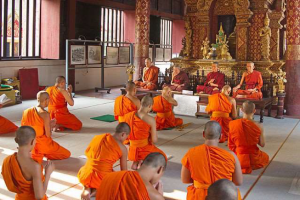Preparing the visiting group
- Inform visitors about issues of modesty and appropriate dress. Dress should be respectful. Remember,these are sacred spaces, not tourist attractions. Short pants and sleeveless shirts are not acceptable for either men or women. Short skirts are not acceptable for women. Modesty should be maintained when sitting on the floor (e.g. school girls should not wear school uniform kilts to sites where guests sit on the floor.)
- T-shirts should be free of advertisements or slogans that may be offensive or uncomfortable to others, even if they are not offensive to the wearer.
- Remind guests that modesty codes are more defined and formal in some cultures. For example, certain physical gestures such as handshakes or embraces are foreign to people of some cultural and religious backgrounds. In some cultures it is inappropriate for men and women to touch. Accordingly, it is better that guests allow members of the host site to take the initiative in terms of gestures such as handshakes or other forms of touching.
- To avoid embarrassment, guests should refrain from physical displays of affection or excessive friendliness toward each other (e.g. holding hands, leaning against one another, arms across one another’s shoulders, etc.) This guideline applies even for husbands and wives.

Buddhist Temple in Chiang Mai, Thailand. Photo credit: Wikimedia
- With the visiting group, review etiquette issues that may be unique to a particular site visit, for example, the prohibition from sitting with one’s feet pointing toward the deities in a Hindu temple, member-only communion in some Christian churches, head coverings, shoes on/off, etc.) If you are unfamiliar with particular points of etiquette in a given house of worship, clarify these when booking the visit.
- Smoking is absolutely prohibited at all site visits. The trip should be considered a smoke-free day, similar to other settings with equivalent expectations (e.g. extended plane trips, etc.)
- Guests are encouraged to ask questions. Any question is acceptable so long as it is asked respectfully.
- Hosts at some sites may ask guests to participate in specific ways in the culture of the host faith group, for example, by learning how to pronounce specific words or phrases in an unfamiliar language, by engaging in meditation or other exercises, etc.) Alert guests to these possibilities and inform them of the expectation to participate. On the other hand, it should be emphasized that any individual visitor has the right to decline participation in any practice, meditation, ritual or exercise.
- Occasionally, a meal or snack may be provided by the house of worship. Because wasting the food of a host tradition is impolite, advise guests to take only what they are prepared to eat and make every effort to eat what they take. It is acceptable to decline food or snacks.
- It is very important that all individuals remain with the larger group as the tour moves through the building. Otherwise, there is a risk of individuals becoming separated from the group and thus delaying the tour.
- Because sitting on the floor may produce an inclination to lean back or recline, remind guests that in a house of worship such a casual posture may be seen as disrespectful.
- Ask the visitors to be respectful of and attentive to the host by not talking amongst themselves during the talk or presentation.
- Encourage guests to take a washroom break before departing for the house of worship.
- Above all, keep in mind that the primary intent of the site visit is that the guests enjoy a day of learning and experience.
Pages: 1 2 3 4 5 6 7 8 9 10 11

